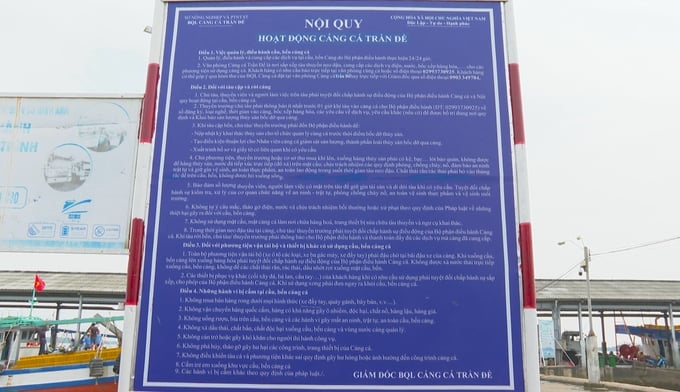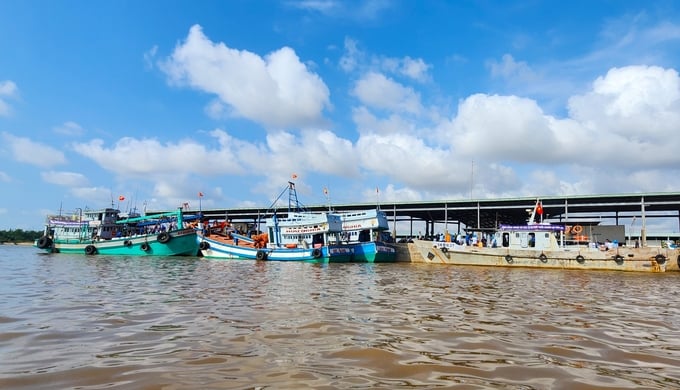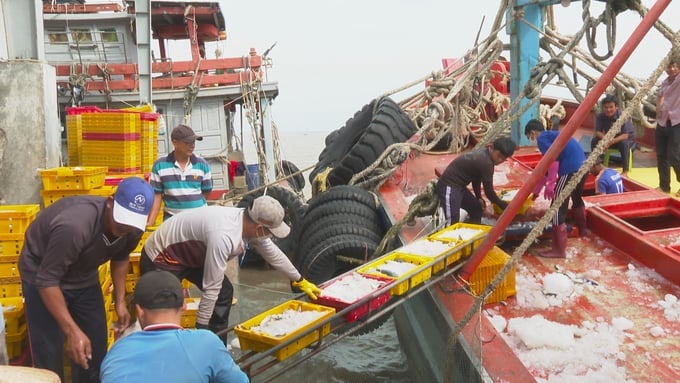November 27, 2025 | 06:45 GMT +7
November 27, 2025 | 06:45 GMT +7
Hotline: 0913.378.918
November 27, 2025 | 06:45 GMT +7
Hotline: 0913.378.918

The rules of operation at Tran De Fishing Port have been installed in the cargo handling area at the port, with specific regulations ensuring the safety of seafood products from fishing activities. Photo: Kim Anh.
Located on the main route leading to Tran De Fishing Port (Soc Trang), the operational regulations board outlines very clear guidelines for ensuring the safety of seafood products from fishing activities, set forth by the Port Management Committee.
"During the loading and unloading of seafood, shelves and mats must be used for storage. Seafood and ice should not come into direct contact with the port surface. Maintain cleanliness, food safety, and labour safety throughout the mooring period."
These regulations have become ingrained knowledge for fishermen, boat owners, and daily workers entering and leaving the port.
Mr Tran Quoc Trong, a worker at Tran De Fishing Port, mentions that every day when transporting fish ashore, he uses mats or rubber sheets to lay on the port floor. Afterwards, he cleans and sweeps the floor to keep it clean, preventing foul odours in the surrounding area. This job is no longer just a responsibility but has become the consciousness of each individual participating in port activities.
Additionally, the seafood storage compartments on boats use non-corrosive and non-toxic materials. Upon arrival at the port, harvested products undergo further processing with clean water before being transported to consumers.
As a locality with a growing fishing industry, Soc Trang province annually harvests over 70,000 tons of seafood. With this strength, equipping essential knowledge about food safety is crucial. Alongside raising awareness among vehicle owners and fishermen directly involved in fishing, it also contributes to reducing post-harvest losses and supplying high-quality seafood products to the market.
Mr. Lu Tan Hoa, Deputy Director of the Fisheries Sub-Department of Soc Trang province, stated that the province currently has 801 fishing vessels, including 344 vessels longer than 15 meters. Certificates of food safety have been issued to over 340 fishing vessels, achieving a rate of 99.4%. This is one of the crucial conditions for combating illegal, unreported, and unregulated (IUU) fishing activities.

Fishing vessels over 15 meters in length must possess a food safety certification, while those under 15 meters must also commit to food safety when operating at sea. Photo: Kim Anh.
Additionally, during the recent period of seafood purchase and export processing, most seafood enterprises in Soc Trang have emphasized the need for raw materials certified for food safety. This certification supports enterprises in ensuring traceability when exporting to the European market.
Currently, the procedures for obtaining food safety certification are relatively straightforward. However, among the 10 criteria for assessing and grading vessels for food safety, some criteria are excessively stringent. As a result, most fishing vessels are classified as Grade B for food safety, requiring regular maintenance checks every 12 months.
In preparation for the fifth inspection by the European Commission (EC), the Sub-Department of Fisheries Soc Trang Province firmly prohibits fishing vessels without food safety certification from operating at sea.

Soc Trang Province aims for 100% of its local fishing vessels to be issued with food safety certification and valid certificates. Photo: Kim Anh
Alongside this goal, the province's fisheries sector is enhancing training workshops and transferring post-harvest seafood preservation techniques. It encourages fishermen operating in distant sea areas to form cooperatives, supporting each other in the harvesting, preservation, and marketing of seafood.
On January 18, 2022, the Ministry of Agriculture and Rural Development issued Circular 01/2022/TT-BNNPTNT amending and supplementing certain circulars in the fisheries sector. This circular mandates that fishing vessels departing from the port for fishing must possess food safety certification. Vessels without this certification are prohibited from going to sea for fishing activities.
Furthermore, Government Decree 115/2018/ND-CP specifies administrative penalties for food safety violations. Fishing vessels lacking food safety certification face fines ranging from VND 30 - 40 million.
According to a report from MARD, the Ministry, as the permanent agency of the National Steering Committee on IUU, sent a delegation to Belgium to meet the Directorate-General for Maritime Affairs and Fisheries (DG MARE), which is a part of the European Commission, from April 22 to April 26. The delegation aimed to address the issue of illegal, unreported, and unregulated fishing activities and discuss the removal of the EC's "yellow card". Additionally, the delegation provided a report on the implementation results of the EC's recommendations after the fourth inspection in October 2023.
Translated by Hoang Duy

(VAN) After the institutional merger, Da Nang possesses significant forest-carbon reserves and is proactively engaging in the carbon market, creating a new revenue stream.

(VAN) An Giang strengthens communication against IUU fishing, increases inspections and sanctions, and is determined to remove the EC’s “yellow card” while developing a sustainable fisheries sector.

(VAN) As green transition becomes a global trajectory, Viet Nam’s biggest challenge is not only technology and models, but how to ensure that capital flows reach the right beneficiaries.

(VAN) The Ministry of Agriculture and Environment must spearhead the construction of green governance, spanning decision-making processes and investment standards to policy evaluation mechanisms.

(VAN) The Agriculture and Environment sector of Khanh Hoa has achieved numerous milestones over the past 80 years, contributing significantly to the goal of establishing the province as a centrally governed city by 2030.

(VAN) Viet Nam is entering the pivotal period of 2025-2030, moving toward the formulation of the Remote Sensing Law, which will establish a legal foundation for the development of national digital data.

(VAN) The agricultural sector is finalizing the strategic framework for emission reduction, setting the goal of sharply cutting methane and 403.7 million tons of CO2 equivalent and moving toward Net Zero by 2050.